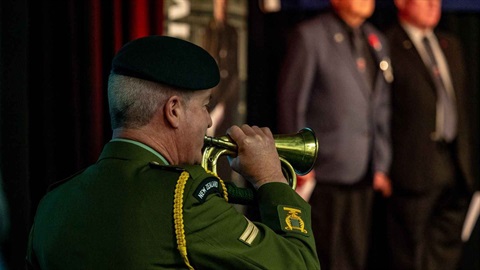Remembrance Day

Armistice Day (later known as Remembrance Day) is commemorated every year on 11 November to mark the armistice signed between the Allies of World War I and Germany to end the fighting. On the 11th hour of the 11th day of the 11th month, there was a ceasefire and the guns fell silent.
Each year a service is held in Te Marae o Hine - The Square to remember and acknowledge the thousands of Kiwis who fought and lost their lives during the Great War of 1914-18.
With a population of only one million in New Zealand at the time, 124,000 served in the First World War. More than 20,000 made the ultimate sacrifice and did not return home, including 898 from the Palmerston North area.
The service includes The Last Post, the playing of the Reveille, and a minute's silence.
The Last Post
The Last Post is a musical 'call' which is usually played on a trumpet or bugle. It's associated with wartime remembrance as it was originally a signal sounding that the final sentry post had been inspected in a military camp inspection, and the area was secure for the night. It was also sounded at the end of battle, so that the injured on the battlefield knew it was safe to move and retreat back to their troops to get help.
Reveille
The purpose of playing the Reveille in military tradition is to wake up the sleeping soldiers. Sentries would be strategically placed around the camp during the night to warn the main force of any sign of the enemy attacking. The sounding of Reveille would let the duty officers know that they had completed their inspection of the perimeter and sentries would be able to stand down.
The word Reveille comes from the French word ‘reveillez’, meaning to ‘wake-up’.
Minute's silence
On the first anniversary of the armistice in 1919, two minutes’ silence was initiated as part of the main commemorative ceremony in London. King George V had requested all the people of the British Empire to suspend normal activities for two minutes on the hour of the Armistice, and it's been popularly adopted since then, becoming a central feature of commemorations of Armistice Day.
Poppy Places
Palmerston North, as well as the rest of New Zealand, has many places named after ordinary New Zealanders at war. These streets have had the red poppy added to their street signs, through the Places of Remembrance project run by the New Zealand Poppy Places Trust.
There are 65 sites and streets of significance signed about Palmerston North (31 around the city and 34 in Linton Military Camp). Streets are launched each year at a ceremony following the Armistice Day civic service.
To explore the Poppy Places in Palmy, you can use the interactive map on the Poppy Places website.